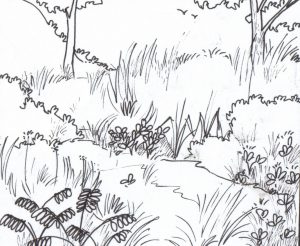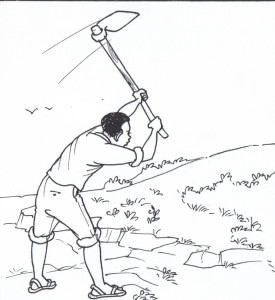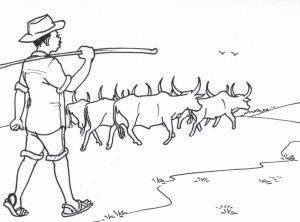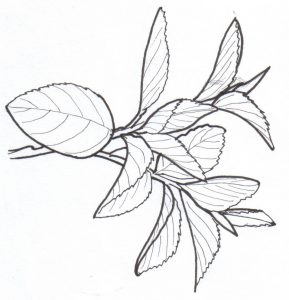Developing Uganda’s traditional medicines and traditional health care practices―and integrating that found to work into the national health care system―will produce a robust health care system that is able to provide better care to Uganda’s population. Below is the guidance in coming up with science-based solutions towards improving Uganda’s traditional medicines and traditional health care practices.
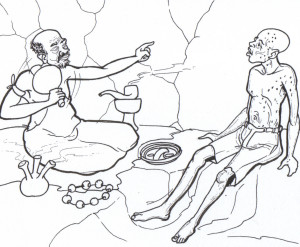
(b) The Science Behind
(i) A human being is not just the physical body you see. He or she has an unseen part called mind and soul.
(ii) The unseen part plays a very important role in the normal functioning of the whole body. Thus, there is a need to engage it during certain healing processes.
(c) Challenge for present Uganda
Integration of prayer, counseling and meditation in modern medicine indicates that traditional Africa had got the healing concept right. Health professional workers, largely because of the brain washing we have undergone as Africans, look down at traditional health practices as if they are completely valueless. Yet, these workers comprise a section of our society, with knowledge and skills to analyse the traditional health practices, select out what works and promote it for our own benefit. Sadly, the wrong attitude prevents them from walking that path.
(d) What you need to consider
(i) Have you ever been sad in your life?
(ii) If yes, did you have energy to carry out normal duties when you are sad?
(iii) Did you know that sadness starts from negative thinking?
(iv) Positive thinking, on the other hand, brings joy and happiness into your life. You feel the energy to do things.
(v) When sick people are filled with positive thoughts, they heal faster.
(vi) What are some of the ways through which sick people can be enabled to embrace positive thoughts?
(vii) What are some of the ways through which health people can embrace and sustain positive thoughts?

(b) The Science Behind
(i) Treatment using single medicine (mono-therapy) promotes resistance of germs to drugs. Once this resistance comes up, the concerned drug becomes useless in treating a disease caused by that germ.
(ii) Besides minimizing development of resistance, combining medicines often leads to better treatment results or outcomes.
(c) Challenge for present Uganda
Western medicine is actively promoting combination therapy in the treatment of diseases. This again shows that our forefathers had got the concept of therapeutic treatment right. Besides, they had also identified several therapeutic herbs and their equivalents. It is the responsibility of health professional workers to analyse these herbs, identify what works and what does not work, figure out how to develop and use that which works or may work, i.e. what to remove, what to add, how to package it for effective delivery into the body, etc, in such away that it becomes more effective at treating diseases. For this to happen however, the attitude of professional health workers needs changing.
(d) What you need to consider
(i) When you fall sick and go to hospital, do they normally give you one type of medicine?
(ii) Have you noticed how difficult it is to take different types of medicines?
(iv) Can medicines be made in such way that they are easy to take, especially by children?
(v) If yes, how can medicines be made easy to take?
(vi) Have you ever heard of patients completing a dose of a given medicine, but they fail to cure?
(vii) If yes, what do you think might be the cause of medicine failing to cure patients?
(viii) What might be in our education system, which makes health professional workers look with contempt at traditional medicines and traditional health practices?
(ix) If you are able to identify the obstacle referred to in (viii) above, can you suggest what to do to address it?

(b) The Science Behind
(i) A bushy place with no human trespass meant largely a germ-free environment, characteristic of theaters in modern hospitals.
(ii) Local brew is diluted alcohol and it kills germs. Indeed, many research laboratories use diluted alcohol to maintain a germ-free environment in their work places.
(c) Challenge for present Uganda
Diluted alcohol can prevent infections during (i) traditional birth-delivery (ii) traditional circumcision (iii) shaving in public salons, etc.
(d) What you need to consider
(i) What is hygiene?
(ii) Do you value hygiene yourself?
(iii) If yes, why and how?
(iv) Do you wash your hands after visiting the toilet or latrine?
(v) If not, please start washing your hands after visiting toilet or latrine?
(vi) Did you know that improving hygiene would reduce significantly the number of people falling sick in Uganda?
(vii) Is there a way you can promote hygiene at your school and home?
(viii) If yes, how?
(b) The Science Behind
An active life style is essential to the well-being of the body.
(c) Challenge for present Uganda
-Failure to exercise our bodies undermines their normal functioning, leading to lifestyle diseases such as diabetes, obesity, heart malfunctioning, etc. Students like you, spending a lot of time sitting in classrooms, must become active in at least one sport. Working people, especially those switching from office work into cars, must find ways of exercising regularly.
(d) What you need to consider
(i) Do you play any sport?
(ii) If yes, do you play that sport out of interest, or do you want to eventually earn money out of it, or is it simply a way of keeping yourself busy?
(iii) You are likely to give up that sport in the near future, when things change, except when you decide to play it as away of keeping fit.
(iv) Without a sport to play, it is difficult to keep yourself fit as an adult.
(v) How do adults who are unfit look like? Do you admire them? If no, why?
(vi) What is it that you can do now that will prevent you from becoming like them?
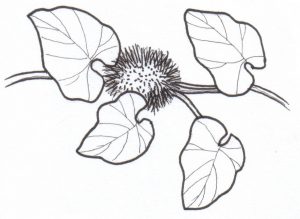
(b) The Science Behind
(i) Plants produce various kinds of chemicals or substances, some of which cure diseases.
(ii) Many medicines sold in drug shops have been obtained directly or indirectly from plants.
(c) Challenge for present Uganda
A lot of work still needs to be done in documenting plant medicines in Uganda. Documentation will help in (i) ensuring better results in treatment using plant medicines (ii) conservation of plant medicines (iii) turning plant medicines into income generating sources.
(d) What you need to consider
(i) Have you ever used any local plant to treat a disease/a body injury?
(ii) If yes, did it cure you?
(iii) Have you ever seen people using local plants to treat themselves or their children?
(iv) Sometimes, you find people with money also using plant medicines. Why?
(v) Did you know that every disease that man suffers has a medicine? That this medicine is in our environment, i.e. plants, rocks, animals, minerals, etc.?
(v) How can we discover and use these medicines, especially with regard to diseases like cancer that have no effective medicines yet?
You can promote relevant knowledge and skills, hidden in our traditional medicines and traditional health care practices, by interesting students in your school into analysing and discussing local health practices, such as the ones described above. This is possible, especially if you a member to any of the following school clubs:
- Debating Club
- Patriotism Club
- Science Club
- Writers’ Club
Becoming wealthy or an influential Person in Uganda
Behind various health challenges facing Uganda are opportunities for creating jobs or making money. Look around carefully for any of these opportunities. The subsections “What you need to consider”, previous page, may provide you with a starting point in identifying these opportunities. If you detect an opportunity, and it sounds interesting to you, take it up as follows:
i. Write it down on paper.
ii. Revisit it after a week and see if it still makes sense.
iii. If the idea still makes sense, get more information about it, especially through reading.
iv. Use the new information to refine your idea (make it clearer).
v. Keep it for an appropriate time. Alternatively, you can share it with your parents or relatives for action.
In other words, you can seize these opportunities while still at school, then turn them into business/jobs after you have completed school or during your long school holidays. This is one of the surest paths before you in becoming a wealthy or an influential person in Uganda and beyond.
By reading this interesting story and changing accordingly, you will become valuable to your country’s efforts in promoting health and wellbeing of its people.
Careers relevant to Health care in Uganda
If you want to establish whether or not you can work as a health professional worker, after completing school, read this interesting story. Some of the careers in health sector in Uganda include:
| Career | Description |
| Biomedical engineer | -Implements engineering principles/techniques in the solution of problems in biology, medicine, dentistry and veterinary science. |
| Chiropractor | -Responsible for the diagnosis, treatment and prevention of functional disorders of the neuromusculo-skeletal system. |
| Clinical laboratory technologist | -Plays a crucial role in detection, diagnosis, and treatment of disease. |
| Dental assistant | -Helps dentists to perform various procedures speedily, with minimum discomfort to the patient. |
| Dental technician | -Manufactures dentures, bridges, crowns, fillings and orthodontic apparatus. |
| Dentist | -Diagnoses, prevents, and treats numerous dental problems and diseases of the teeth, gums and mouth. |
| Dietician/Nutritionist | -Utilizes the science of nutrition to maintain good health, and to prevent and control diseases in people from all walks of life. |
| Doctor/Specialist | -Treats sick people, or makes people healthier. |
| Environmental health officer | -Responsible for the management of environmental affairs that have an influence on the human well-being. |
| Homoeopath | -Uses minute quantities of plant, mineral and other therapeutic substances, prepared according to a specific method, to gently stimulate patients back to health. |
| Medical physicist | -Concerned with the application of physics in medicine to enhance the health care of the community. |
| Microbiologist | -Studies the anatomy, genetics and physiology of microorganisms, as well as the vital interactions between microorganisms and the environment. |
| Molecular biologist/biotechnologist | -Develops methods to control biological processes for use in industry, agriculture, forestry, horticulture and breeding. |
| Nurse | -Takes care of sick and injured people. |
| Occupational therapist | -Treats people through active participation in purposeful activities, in order to enable them to regain their health, return to their community and enjoy quality of life. |
| Optical dispenser | -Dispenses spectacles to people with vision defects so that they can achieve the best vision possible. |
| Optical technician/optician | -Prepares lenses according to prescription from optometrists and ophthalmologists. |
| Optometrist/ophthalmologist | -Deals with human vision, and aims to give patients clear and efficient vision. |
| Oral hygienist | -Aids individuals to attain and maintain optimum oral health. |
| Parasitologist | -Studies organisms that use man or other animals as hosts for their survival. |
| Physiologist | -Studies the normal functioning of living organisms. |
| Physiotherapist | -Use their hands, mechanical and electrical machines as well as natural elements to assist clients in the alleviation of pain, restoration to good health and enhancement of function. |
| Podiatrist | -Specializes in the diagnosis and management of problems, injuries or pathology relating to the human foot. |
| Psychiatrist | -Prevents/treats mental disorders. |
| Psychologist: Industrial/clinical/educational | -Studies the human mind, and tries to explain why people act as they do. |
| Radiation protectionist | -Involved in the protection of humans and the environment against the dangerous effects of the incorrect use of radiation and radioactive materials. |
| Radiographer | -Uses X-rays or other radiation media or ultrasound for the detection and treatment of an illness. |
| Recreation worker | -Plans and teaches activities that people enjoy in their free time. Include fitness workers, camp directors, aerobics instructors, etc. |
| Recreational therapist | -Uses sports, games, arts, crafts, and music to help patients build confidence and get back into life. |
| Speech and hearing therapist | -Helps babies, children, and adults who have communication disorders, to overcome or reduce their communication handicaps. |
